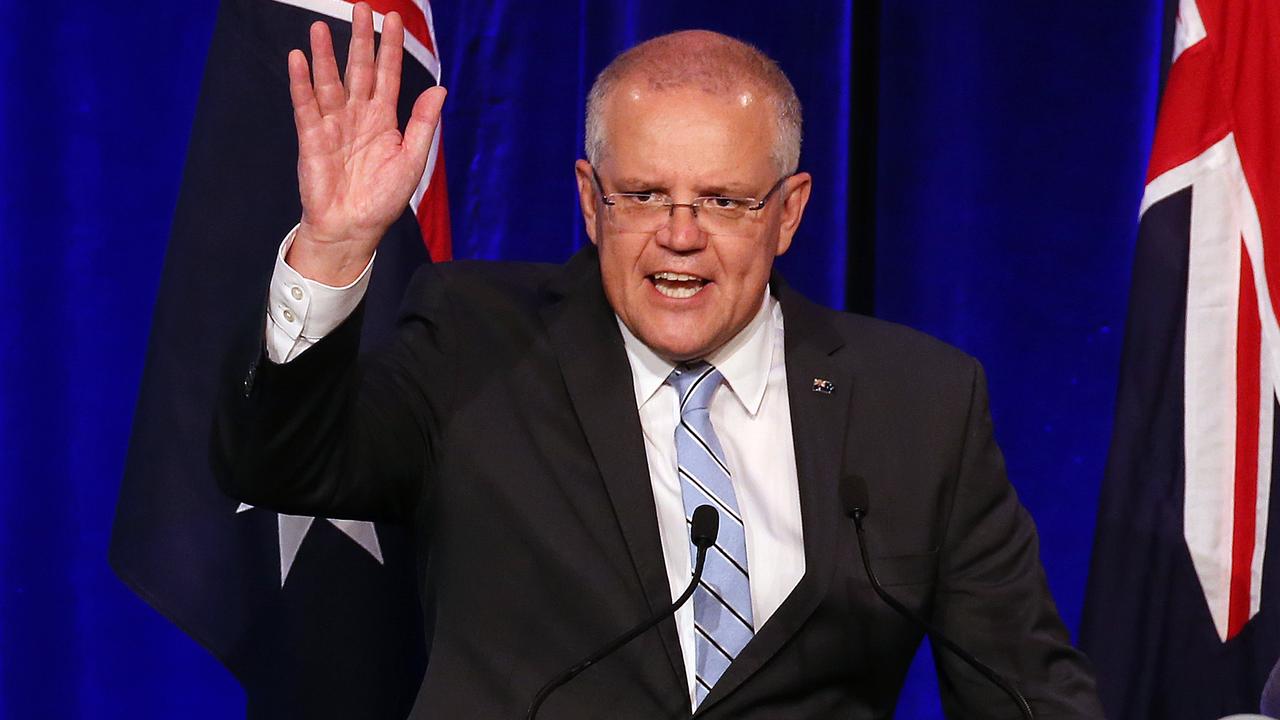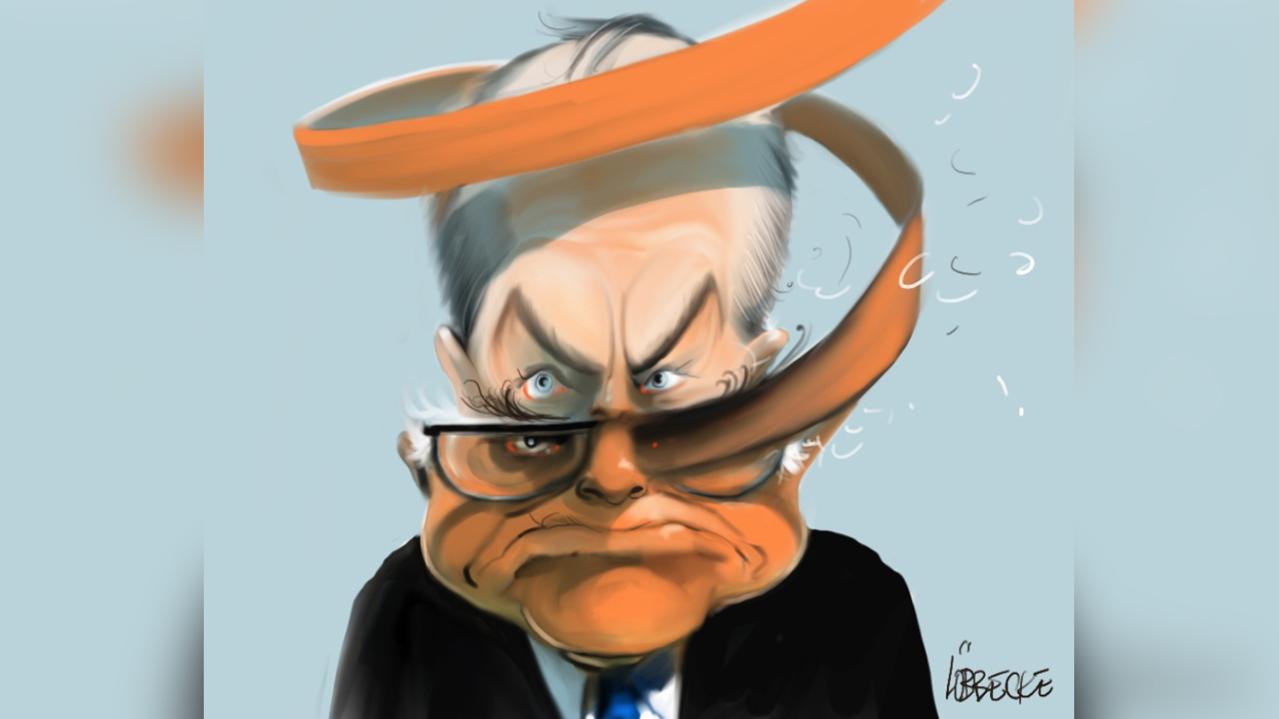Politicians prove the hate media got it right
DISCREDITING tactics are as old as politics. But there has been an increase of efforts in recent years by the political class to discredit the media in a bid to minimise the fallout that damaging stories may cause it.
A classic example was on display at the National Press Club on July 14 last year when Julia Gillard was asked about reporting of strong public opposition to her carbon tax.
"If I could put it as clearly as I can, I'd say to you: don't write crap. Can't be that hard," the Prime Minister said.
She went on to suggest that media standards were lower now than in the past: "I think what's changed is the volume of crap," she added.
That's called "shooting the messenger".
The Gillard government has been active at this purpose, as has its alliance partner, the Greens, helped along by controversies involving the media overseas, making it an easier target.
Political leaders' confected outrage at journalists and editors for providing scrutiny of them and their parties is all very ironic, hypocritical even, as Labor and the Greens traded blows this week about the value of each party in the Australian political process.
This newspaper's past criticisms of the Greens look positively tame side by side the recent rhetoric used by senior Labor Party officials and MPs.
The criticisms about former prime minister Kevin Rudd that various media outlets, including this one, reported during his time in power look even tamer when put side by side with what Rudd's own colleagues said about him in February this year in a bid to stave off his return to the leadership.
Wayne Swan, who had long scoffed at media reports about dysfunction in the government, said in an ABC interview on February 23 this year: "Prime minister Rudd (was) deeply flawed." The Treasurer added that Rudd "has great weaknesses, great weaknesses which today have not necessarily been seen in public". Communications Minister Stephen Conroy said Rudd "had contempt for the cabinet, contempt for the cabinet members, contempt for the caucus, contempt for the parliament".
Yet almost unaware of the irony associated with their own actions, the government and the Greens go on condemning anyone who dares criticise them, or their ongoing alliance, as "running an agenda".
Conroy, after nearly two years serving Rudd in what, according to his own words, can be described only as a dysfunctional situation, bemoans media criticisms of the government as lacking balance.
Swan does the same.
It's a flagrant attempt to discredit one's critics. Not by the virtue of argument but instead by writing off criticisms as unfounded because of who or what organisation it is that is making the criticism.
Bob Brown took to calling the News Limited empire "the hate media" during his time leading the Greens. At a press conference on May 19 last year Brown said: "I'm just wondering why the hate media can't be more responsible and constructive."
But nothing that the so-called hate media has said about the Greens has come close to comparing them to One Nation, as NSW Labor state secretary Sam Dastyari and Australian Workers Union national secretary Paul Howes did last weekend.
Dastyari told this newspaper on July 7 that the Greens were "extremists not unlike One Nation": "The Greens are to the Left what Pauline Hanson and One Nation are to the Right." The following day Howes wrote in Sydney newspaper The Sunday Telegraph that the Greens were "the most dangerous of the fringe parties", again comparing them to One Nation.
Nothing this newspaper has editorialised through the years has come close to the rhetoric deployed this week by senior Labor figures, who described the Greens as "loopy" and "extremists". Human Services Minister Kim Carr called the Greens "smug and self-righteous" on Tuesday. On the same day chief government Whip Joel Fitzgibbon described the Greens policy manifesto as "economically destructive".
I look forward to Robert Manne's sequel to his Quarterly Essay "Bad News: Murdoch's Australian and the Shaping of the Nation". Perhaps it could be titled: "Bad relationship: The Greens-Labor fallout". Just as Manne's earlier essay included a section on The Australian's reporting and editorialising on the Greens, any follow-up essay would need to include analysis of the far more toxic commentary the Greens and Labor have engaged in about one another.
No editorial or reporting on the government (or the opposition) The Australian has published since Labor came to power in November 2007 has come close to the language used by the Greens to describe their alliance partner: calling Labor "diseased", as new Greens leader Christine Milne did, or attacking Labor for not holding any values whatsoever, as Sarah Hanson-Young said last Sunday on Sky News' Australian Agenda.
Yet sections of the political class go on believing it is the media that needs statutory oversight to improve standards.
But Labor's criticism of the Greens and vice versa isn't the first time condemnation between politicians has exceeded criticism levelled at the political class by the media. February was a nasty period of public character assassinations by Labor about its former leader, Rudd.
Labor backbencher Steve Gibbons kicked off the public war of words between Gillard and Rudd supporters when he used Twitter to label Rudd "a psychopath with a giant ego" on February 20.
That extraordinary attack was because Rudd had the temerity to believe he could do a better job running the country than Gillard could. Given she has presided over the lowest Labor primary vote since polling began it would seem the public agrees with Rudd, even if the Labor parliamentary caucus overwhelmingly did not.
Gibbons's onslaught against Rudd leaves the countless column centimetres criticising Rudd's performance as prime minister in this newspaper and others in his wake. Yet at the time, when journalists were writing about what Rudd was like away from the media spotlight (incidentally, where does anyone think journalists come up with such assessments?), politicians were quick to label the media "sensationalist" and "prone to making things up".
Discrediting the media for making up news stories is a common tactic politicians use. As deputy prime minister Gillard used to talk about "silly" news coverage that had "chewed up space that should have been put to better purpose", as she told an education forum in Sydney on July 29, 2009.
At a doorstop interview on July 20 last year, Prime Minister Gillard used the hacking controversy engulfing News International newspapers in Britain to tar and feather News Limited operations in this country, even though not one case of hacking in Australia has been found to have occurred: "I do think that (the British cases) causes them to ask some questions here in our country, some questions about News Limited here."
It was a perfect example of the tactic of discrediting one's critics. Asked what those questions in need of answering were, Gillard's response was mute. The discrediting tactic rarely has substance to back it up.
Sigmund Freud in On Metapsychology argued that shooting the messenger was something leaders did to compensate for a sense of powerlessness in their own political paradigm.
Swan has attacked The Daily Telegraph's coverage as not being balanced. On Channel 9 on November 3 last year Conroy chimed in, describing The Daily Telegraph as intent on "bringing the government down".
What some political leaders seem to miss is newspapers have long sought to reflect the views of their readers, and for a sustained period opinion polls have shown the public is down on the government and ready to vote it out of office. It is not accurate to describe coverage reflecting that reality as "not balanced".
Perhaps two of the sharpest criticisms of the Labor-Greens alliance this newspaper has engaged in were an analysis piece by political editor Dennis Shanahan arguing for a fresh election after unresolved negotiations during the notorious 17 days of uncertainty after the 2010 election, and an editorial expressing anticipation of a Greens demise at the next election. Few could argue Shanahan's judgment then was anything other than in line with what the public now wishes had happened. And the editorial was a tame version of what most within Labor are clearly hoping for.
In a radio interview on July 1, 2009, then deputy PM Gillard was quick to attack News Limited for not accurately describing what Rudd had said in reports. She wanted "some explanation as to how that kind of reporting went on".
Soon before mounting her challenge to Rudd's prime ministership Gillard told journalists there was more chance of her becoming "full forward for the Western Bulldogs" than contesting the 2010 election as prime minister.
Nevertheless, journalists and commentators went on (accurately) reporting what they were being told was going on behind the political scenes. They were duly criticised for making up the stories, yet sure enough Rudd was challenged by Gillard before the 2010 winter parliamentary recess.
On November 3 last year prominent left-wing Labor senator and Rudd backer Doug Cameron declared the "Murdoch press" ran "fabricated stories in relation to the leadership of the party". Yet sure enough, a few months later, Cameron was openly working the numbers for a Rudd return. Perhaps the only media fabrication in relation to talk of a Rudd challenge was the inflated numbers Rudd backers claimed he had supporting him.
Politicians like to discredit the media in an attempt to lift their own standing in the eyes of the community.
They do so by denying stories, accusing journalists and editors of lacking balance, and condemning journalistic standards.
However if the present term of parliament, including the antics of this past week, has taught us anything, the media has simply been in front of the politicians when it comes to offering commentary. But we haven't been nearly as harsh when doing so.
Peter van Onselen is a political scientist at the University of Western Australia and its foundation professor of journalism.


